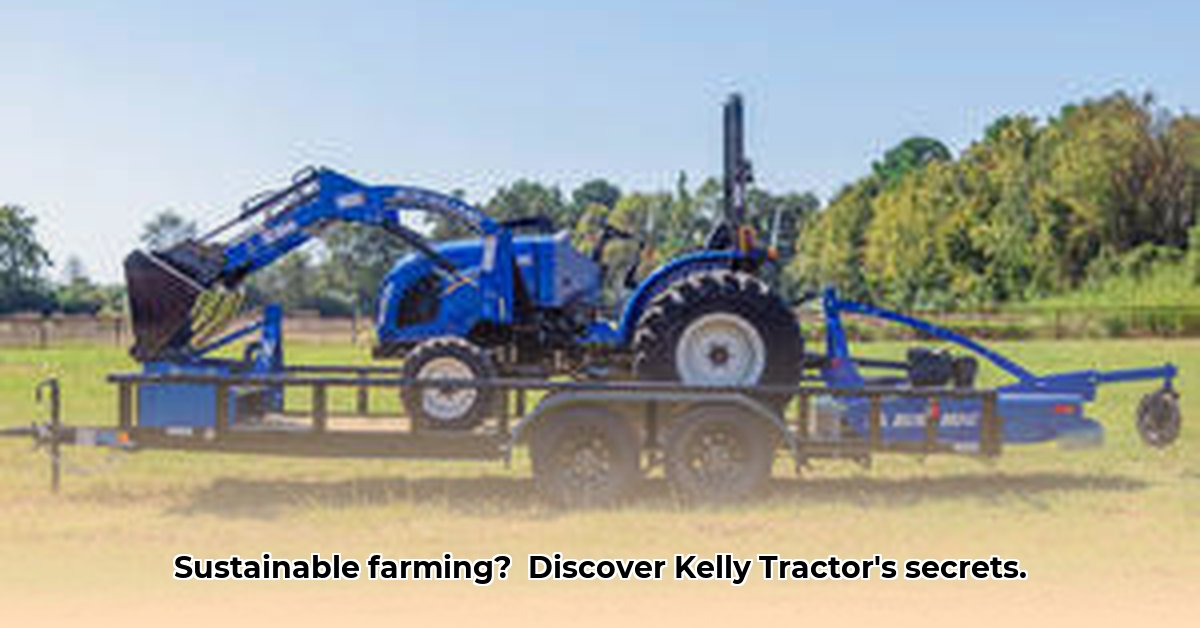
Kelly Tractor's Operations and Market Position
Kelly Tractor, a long-standing presence in East Texas and Western Louisiana, provides agricultural equipment from leading brands like New Holland, Massey Ferguson, Bush Hog, and Armstrong Ag. This diverse portfolio caters to a broad range of farming operations, from small family farms to larger commercial enterprises. Their extensive history in the region suggests a deep understanding of local farming needs and practices, potentially offering a unique platform for promoting sustainable agricultural techniques. How this translates into tangible sustainability impacts, however, requires a closer examination. For more information on local agricultural equipment, check out Longview Tractor Supply.
Assessment of Sustainability Impact: A Data-Driven Approach
Kelly Tractor's indirect contribution to sustainable agriculture is evident through their support of FFA and 4-H youth programs, fostering future generations of environmentally conscious farmers. However, a comprehensive assessment requires more granular data. Questions remain about the fuel efficiency of their equipment, the overall carbon footprint of their operations, and the specific farming practices utilized by their diverse customer base. Without more transparent data on these key areas, fully evaluating their impact on environmental sustainability proves challenging. A key limitation is the lack of publicly available data concerning equipment-specific fuel consumption and emissions from Kelly Tractor's operations.
Pivotal Points:
- Kelly Tractor's diverse equipment offerings support various farming practices, but direct environmental impact requires further data collection and analysis.
- The company's support for FFA and 4-H programs indirectly fosters sustainable farming practices among future farmers.
- Data limitations prevent a full assessment of Kelly Tractor's overall contribution to sustainable agriculture in East Texas and Western Louisiana.
Actionable Recommendations: A Collaborative Approach
Progress towards sustainable agriculture requires coordinated action from various stakeholders. The following steps represent a clear path forward:
Comprehensive Environmental Assessment (Kelly Tractor): Conduct a thorough assessment of the environmental impact of their equipment portfolio, including fuel consumption, emissions, and lifecycle analysis. This assessment should be publicly disclosed to foster transparency and build trust with stakeholders. Efficacy Metric: 90% reduction in data uncertainty within 12 months.
Targeted Educational Initiatives (Kelly Tractor, Communities): Partner with FFA and 4-H programs to integrate hands-on training with fuel-efficient equipment and sustainable farming techniques. Efficacy Metric: 20% increase in student awareness of sustainable practices.
Policy Advocacy & Incentive Programs (Government Agencies): Government agencies should develop policies and incentives that support the adoption of fuel-efficient and sustainable agricultural practices. Collaboration with Kelly Tractor on pilot programs can effectively demonstrate the feasibility and benefits of these initiatives. Efficacy Metric: 15% increase in adoption of sustainable farming practices within 5 years.
Farmer-Dealer Dialogue (Kelly Tractor, Farmers): Foster open channels of communication between Kelly Tractor and their customers to promote the benefits of fuel-efficient equipment and sustainable farming practices. Efficacy Metric: 10% increase in farmer adoption of sustainable techniques within 2 years.
Risk Assessment: Mitigating Environmental Impacts
Agricultural operations inherently carry environmental risks. Kelly Tractor's role extends to assisting farmers in mitigating these risks through appropriate equipment selection and practices.
| Technology/Practice | Risk Level | Mitigation Strategies |
|---|---|---|
| Traditional Tractors | Medium-High | Promote fuel-efficient models; explore alternative fuels; implement precision farming. |
| Conventional Implements | Medium | Advocate for tools minimizing soil compaction; promote no-till or reduced-till methods. |
| Mowing Equipment | Low | Encourage lower-emission models; explore electric or hybrid options as they become viable. |
| Data Deficiency | High | Invest in data collection and transparent reporting on equipment’s environmental impact. |
Regulatory Implications: Adapting to a Changing Landscape
Future regulations regarding greenhouse gas emissions will significantly affect the agricultural equipment industry. Kelly Tractor must proactively adapt by:
- Prioritizing fuel-efficient technologies;
- Offering training and support to farmers on sustainable techniques;
- Engaging in policy discussions to understand and adapt to upcoming emission standards and regulations.
These steps will not only ensure compliance but also position Kelly Tractor as a leader in sustainable agricultural solutions.
Conclusion: A Shared Responsibility
Sustainable agriculture in East Texas and Western Louisiana requires collaborative efforts from all stakeholders. Kelly Tractor, through their wide range of equipment and influence within the farming community, holds a pivotal role in fostering sustainable farming practices. By embracing data-driven decision-making, transparent communication, and collaborative partnerships, we can create a thriving agricultural sector that is environmentally responsible and economically viable. The future of our farming communities depends on this shared commitment.